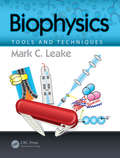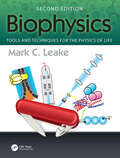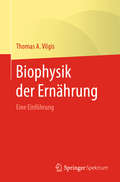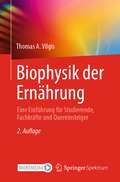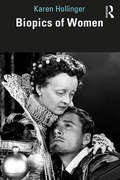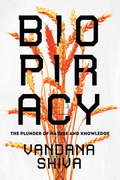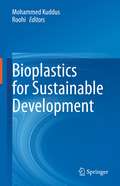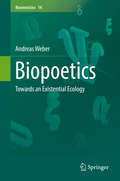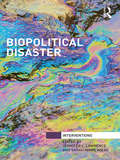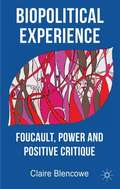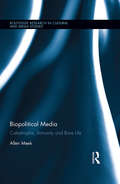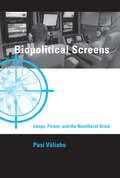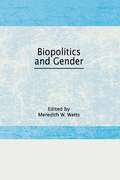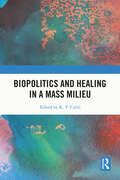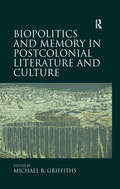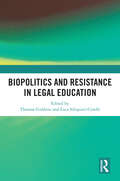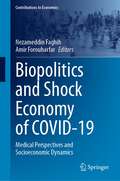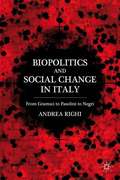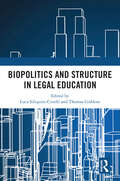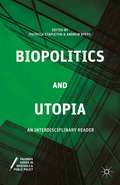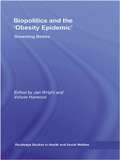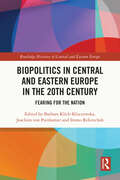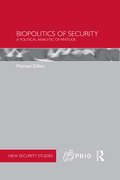- Table View
- List View
Biophysics: Tools and Techniques
by Mark C. LeakeAn Up-to-Date Toolbox for Probing Biology Biophysics: Tools and Techniques covers the experimental and theoretical tools and techniques of biophysics. It addresses the purpose, science, and application of all physical science instrumentation and analysis methods used in current research labs. The book first presents the historical background, concepts, and motivation for using a physical science toolbox to understand biology. It then familiarizes undergraduate students from the physical sciences with essential biological knowledge. The text subsequently focuses on experimental biophysical techniques that primarily detect biological components or measure/control biological forces. The author describes the science and application of key tools used in imaging, detection, general quantitation, and biomolecular interaction studies, which span multiple length and time scales of biological processes both in the test tube and in the living organism. Moving on to theoretical biophysics tools, the book presents computational and analytical mathematical methods for tackling challenging biological questions including exam-style questions at the end of each chapter as well as step-by-step solved exercises. It concludes with a discussion of the future of this exciting field. Future innovators will need to be trained in multidisciplinary science to be successful in industry, academia, and government support agencies. Addressing this challenge, this textbook educates future leaders on the development and application of novel physical science approaches to solve complex problems linked to biological questions. Features: Provides the full, modern physical science toolbox of experimental and analytical techniques, such as bulk ensemble methods, single-molecule tools, and live-cell and test tube methods Incorporates worked examples for the most popular physical science tools, including full diagrams and a summary of the science involved in the application of the tool Reinforces the understanding of key concepts and biological questions A solutions manual is available upon qualifying course adoption.
Biophysics: Tools and Techniques for the Physics of Life
by Mark C. LeakeBiophysics: Tools and Techniques for the Physics of Life covers the experimental, theoretical, and computational tools and techniques of biophysics. It addresses the purpose, science, and application of all physical science instrumentation, theoretical analysis, and biophysical computational methods used in current research labs. The book first presents the historical background, concepts, and motivation for using a physical science toolbox to understand biology. It then familiarizes undergraduate students from the physical sciences with essential biological knowledge. The text subsequently focuses on experimental biophysical techniques that primarily detect biological components or measure/control biological forces. The author describes the science and application of key tools used in imaging, detection, general quantitation, and biomolecular interaction studies, which span multiple length and time scales of biological processes both in the test tube and in the living organism. Moving on to theoretical and computational biophysics tools, the book presents analytical mathematical methods and numerical simulation approaches for tackling challenging biological questions including exam-style questions at the end of each chapter as well as step-by-step solved exercises. It concludes with a discussion of the future of this exciting field. Future innovators will need to be trained in multidisciplinary science to be successful in industry, academia, and government support agencies. Addressing this challenge, this textbook educates future leaders on the development and application of novel physical science approaches to solve complex problems linked to biological questions. Features: Provides the full, modern physical science toolbox of experimental, theoretical, and computational techniques, such as bulk ensemble methods, single-molecule tools, live-cell and test tube methods, pencil-on-paper theory approaches, and simulations. Incorporates worked examples for the most popular physical science tools by providing full diagrams and a summary of the science involved in the application of the tool. Reinforces the understanding of key concepts and biological questions. A solutions manual is available upon qualifying course adoption.
Biophysik der Ernährung: Eine Einführung
by Thomas A. VilgisVerstehen Sie die unzähligen, widersprüchlichen Ernährungsempfehlungen nicht mehr? Können Sie beim Cholesterin nur ganz schwer zwischen Gut und Böse unterscheiden? Verstehen Sie nicht, warum 12 Nüsse pro Tag gut für Ihr Herz und Kreislauf sein sollen? Sind Sie hin- und hergerissen zwischen verschiedenen Ernährungsregeln und Ernährungsformen, die täglich auf Sie hereinprasseln, und verzweifeln am Begriff „gesunde Ernährung“? Oder sind Sie beruflich, z. B. als Berater oder Fitnesscoach, mit Fragen rund um Ernährung konfrontiert und möchten sich die naturwissenschaftlichen Grundlagen aneignen? Der Autor Thomas Vilgis rät, dabei erst einmal gelassen zu bleiben und sachlich über alle Mutmaßungen, Vermutungen, Versprechen, Orientierungsvorschläge nachzudenken.Das Buch führt Sie abseits ausgetretener Pfade und mit naturwissenschaftlicher, nüchterner Sicht an grundsätzliche Fragen der Ernährung heran. Ausgehend von der Ernährungsgeschichte des Homo sapiens begleitet Sie der Autor in das grundlegende Zusammenspiel zwischen Proteinen, Fetten und Kohlenhydraten, was sie im Körper bewirken, wie sie verdaut werden und welche Rolle sie wirklich spielen. So zeigt sich rasch, wie wenig sich hinter manchen zweifelhaften Aussagen verbirgt. Mit dem Anspruch einer ideologiefreien, molekularen Sicht auf die Ernährung gelingt es, auf verständliche und unterhaltsame Weise so manche fragwürdige Empfehlung zur Ernährung zu relativieren und zu entlarven.
Biophysik der Ernährung: Eine Einführung für Studierende, Fachkräfte und Quereinsteiger
by Thomas A. VilgisVerstehen Sie die unzähligen, widersprüchlichen Ernährungsempfehlungen nicht mehr? Können Sie beim Cholesterin nur ganz schwer zwischen Gut und Böse unterscheiden? Sind Sie hin- und hergerissen zwischen verschiedenen Ernährungsregeln und Ernährungsformen, die täglich auf Sie hereinprasseln, und verzweifeln am Begriff „gesunde Ernährung“? Oder sind Sie beruflich, z. B. als Berater oder Fitnesscoach, mit Fragen zum Thema Ernährung konfrontiert und möchten sich die naturwissenschaftlichen Grundlagen aneignen? Der Autor Thomas Vilgis rät, dabei erst einmal gelassen zu bleiben und sachlich über alle Mutmaßungen, Vermutungen, Versprechen und Orientierungsvorschläge nachzudenken.Dieses Buch führt Sie abseits ausgetretener Pfade und mit naturwissenschaftlicher, nüchterner Sicht an grundsätzliche Fragen der Ernährung heran. Ausgehend von der Ernährungsgeschichte des Homo sapiens begleitet Sie der Autor in das grundlegende Zusammenspiel zwischen Proteinen, Fetten und Kohlenhydraten, was sie im Körper bewirken, wie sie verdaut werden und welche Rolle sie wirklich spielen. Unterstützend finden Sie in der zweiten Auflage verschiedene abrufbare Videos, in denen komplexe Zusammenhänge anschaulich erklärt werden. So zeigt sich rasch, wie wenig sich hinter manchen zweifelhaften Aussagen verbirgt. Mit dem Anspruch einer naturwissenschaftlichen und molekularen Sicht auf die Ernährung gelingt es, auf verständliche und unterhaltsame Weise so manche fragwürdige Empfehlung zur Ernährung zu relativieren und einzuordnen.
Biophysik in der Zelle
by Hendrik Dietz Thomas BornschlöglDieses Lehrbuch richtet sich an alle Studierenden der Naturwissenschaften, die einen Einblick in die physikalische Beschreibung grundlegender zellulärer Prozesse suchen. Unter anderem werden die Phänomene der Diffusion und die Mechanik von Makromolekülen behandelt und an vielen Beispielen illustriert. Weiter werden die Bildung der Faserproteine des Zytoskeletts, die mechanischen Eigenschaften der Lipidmembran der Zelle sowie die Enzymkinetik und die Funktionsweise molekularer Motoren besprochen. <P><P> Dieses kompakte Buch baut auf einer zweisemestrigen Vorlesung mit dem Titel Biophysik in der Zelle auf, die an der Technischen Universität München gehalten wird. Um unterschiedliche Herangehensweisen zu unterstreichen und damit verständlicher zu gestalten, werden wichtige Formeln oft auf verschiedenen Wegen hergeleitet. „Übrigens“-Abschnitte, in denen historische oder aktuelle Hintergründe und der wissenschaftliche Zeitgeist der jeweiligen Forschung beleuchtet werden, reichern den Stoff kurzweilig an. Ansprechende, klare und moderne Abbildungen geben dem Buch neben dem fachlich aktuellen und verständlich dargestellten Inhalt einen besonderen Charme.
Biophysik in der Zelle: Für angehende Naturwissenschaftler
by Hendrik Dietz Thomas BornschlöglDieses Lehrbuch richtet sich an alle Studierenden der Naturwissenschaften, die einen Einblick in die physikalische Beschreibung grundlegender zellulärer Prozesse suchen. Unter anderem werden die Phänomene der Diffusion und die Mechanik von Makromolekülen behandelt und an vielen Beispielen illustriert. Weiter werden die Bildung der Faserproteine des Zytoskeletts, die mechanischen Eigenschaften der Lipidmembran der Zelle sowie die Enzymkinetik und die Funktionsweise molekularer Motoren besprochen. Dieses kompakte Buch baut auf einer zweisemestrigen Vorlesung mit dem Titel Biophysik in der Zelle auf, die an der Technischen Universität München gehalten wird. Um unterschiedliche Herangehensweisen zu unterstreichen und damit verständlicher zu gestalten, werden wichtige Formeln oft auf verschiedenen Wegen hergeleitet. „Übrigens“-Abschnitte, in denen historische oder aktuelle Hintergründe und der wissenschaftliche Zeitgeist der jeweiligen Forschung beleuchtet werden, reichern den Stoff kurzweilig an. Ansprechende, klare und moderne Abbildungen geben dem Buch neben dem fachlich aktuellen und verständlich dargestellten Inhalt einen besonderen Charme. Aus dem Inhalt: - Entstehung und Aufbau von Zellen, grundlegende Begriffe der Biophysik und wichtige Grundlagen der Thermodynamik und statistischen Mechanik - Passive Bewegung durch Diffusion: Physikalische Beschreibung der Diffusion, Gittermodelle, Diffusion in einem Potential, biochemische Reaktionen - Mechanik von Balken, Polymeren und Membranen: Elastische Eigenschaften biologischer Bauelemente, Kräfte, Biegen, Dehnen, Strecken und Reißen der Zellmembran und des Zytoskeletts. - Aktive Bewegung und Enzymkinetik: Funktionsweise von Enzymen, molekulare Motoren und die Dynamik der Faserproteine im Zytoskelett
Biopics of Women ("International Perspectives on Science, Culture and Society")
by Karen HollingerThis book is an accessible overview of biographical fiction films of women and is structured around four of the most popular subjects of female biopics: queens and political figures; entertainers; writers; and subjects of current affairs. While the biopic is commonly accepted as a deeply conservative cinematic form that represents glorification of the past and of the self-made individual, a number of biopics of women challenge all of these characterizations. They show the genre to be much more complicated and challenging to regressive ideas than has been proposed, and open to different formats and thematic possibilities. Providing an overview of key subgenres complemented by analyses of key texts that illustrate major aspects of each category, Biopics of Women examines the development of biographical films in each area and the images of successful women they project in order to investigate the issues involved in women’s representation in the genre as a whole. This is a lively and readable text for students and scholars in Gender and Film, Gender and Media, and Women’s Studies.
Biopiracy: The Plunder of Nature and Knowledge
by Vandana ShivaGenetic engineering and the cloning of organisms are "the ultimate expression of the commercialization of science and the commodification of nature.... Life itself is being colonized," according to renowned environmentalist Vandana Shiva. The resistance to this biopiracy, she argues, is the struggle to conserve both cultural and biological diversity. As the land, forests, oceans, and atmosphere have already been colonized, eroded, and polluted, corporations are now looking for new colonies to exploit and invade for further accumulation--in Shiva's view, the interior spaces of the bodies of women, plants, and animals. Featuring a new introduction by the author, this edition of Biopiracy is a learned, clear, and passionately stated objection to the ways in which Western businesses are being allowed to expropriate natural processes and traditional forms of knowledge. From the Trade Paperback edition.
Bioplastics for Sustainable Development
by Mohammed Kuddus RoohiThis book provides the latest information on bioplastics and biodegradable plastics. The initial chapters introduce readers to the various sources and substrates for the synthesis of bioplastics and biodegradable plastics, and explain their general structure, physio-chemical properties and classification.In turn, the book discusses innovative methods for the production of bioplastics at the industrial level and for the microbial production of bioplastics. It highlights the processes that are involved in the conversion of agro-industrial waste into bioplastics, while also summarizing the mechanisms of biodegradation in bioplastics.The book addresses a range of biotechnological applications of bioplastics such as in agriculture, food packaging and pharmaceutical industry, as well as biomedical applications.
Biopoetics: Towards an Existential Ecology (Biosemiotics #14)
by Andreas WeberMeaning, feeling and expression - the experience of inwardness - matter most in human existence. The perspective of biopoetics shows that this experience is shared by all organisms. Being alive means to exist through relations that have existential concern, and to express these dimensions through the body and its gestures. All life takes place within one poetic space which is shared between all beings and which is accessible through subjective sensual experience. We take part in this through our empirical subjectivity, which arises from the experiences and needs of living beings, and which makes them open to access and sharing in a poetic objectivity. Biopoetics breaks free from the causal-mechanic paradigm which made biology unable to account for mind and meaning. Biology becomes a science of expression, connection and subjectivity which can understand all organisms including humans as feeling agents in a shared ecology of meaningful relations, embedded in a symbolical and material metabolism of the biosphere.
Biopolitical Disaster (Interventions)
by Jennifer L. Lawrence Sarah Marie WiebeBiopolitical Disaster employs a grounded analysis of the production and lived-experience of biopolitical life in order to illustrate how disaster production and response are intimately interconnected. The book is organized into four parts, each revealing how socio-environmental consequences of instrumentalist environmentalities produce disastrous settings and political experiences that are evident in our contemporary world. Beginning with "Commodifying crisis," the volume focuses on the inherent production of disaster that is bound to the crisis tendency of capitalism. The second part, "Governmentalities of disaster," addresses material and discursive questions of governance, the role of the state, as well as questions of democracy. This part explores the linkage between problematic environmental rationalities and policies. Third, the volume considers how and where the (de)valuation of life itself takes shape within the theme of "Affected bodies," and investigates the corporeal impacts of disastrous biopolitics. The final part, "Environmental aesthetics and resistance," fuses concepts from affect theory, feminist studies, post-positivism, and contemporary political theory to identify sites and practices of political resistance to biopower. Biopolitical Disaster will be of great interest to postgraduates, researchers, and academic scholars working in Political ecology; Geopolitics; Feminist critique; Intersectionality; Environmental politics; Science and technology studies; Disaster studies; Political theory; Indigenous studies; Aesthetics; and Resistance.
Biopolitical Experience
by Claire BlencoweAn original, comprehensive interpretation of Michel Foucault's analysis of biopolitics situating biopolitics in the context of embodied histories of subjectivity, affective investments and structures of experience. Going beyond lamentation at the horrors of biopolitical domination, the book develops a positive-critique of biopolitical experience. "
Biopolitical Media: Catastrophe, Immunity and Bare Life (Routledge Research in Cultural and Media Studies)
by Allen MeekThis book presents an historical account of media and catastrophe that engages with theories of biopolitics in the work of Michel Foucault, Giorgio Agamben, Michael Hardt, Antonio Negri and others. It explains how responses to catastrophe in media and cultural criticism over the past 150 years are embedded in biological conceptions of life and death, contamination and immunity, race and species. Mediated catastrophe is often understood today in terms of collective memory and according to therapeutic or redemptive accounts of trauma. In contrast to these approaches this book emphasizes the use of media to record, archive and analyze physical appearance and movement; to capture viewer attention through shock; to monitor and control bodies in economies of production and consumption; to enmesh social relations in information networks; and situate subjects in discourses of victimhood, immunity, survival and resilience. Chapters are focused on historical case studies of early photography, Nazi propaganda, colonial stereotypes, Hiroshima, the Holocaust, the Cold War and the war on terror.
Biopolitical Screens: Image, Power, and the Neoliberal Brain (Leonardo)
by Pasi ValiahoAn investigation of the aesthetics and politics of new visual media under twenty-first-century capitalism, from console games to virtual reality to video installation art. In Biopolitical Screens, Pasi Väliaho charts and conceptualizes the imagery that composes our affective and conceptual reality under twenty-first-century capitalism. Väliaho investigates the role screen media play in the networks that today harness human minds and bodies—the ways that images animated on console game platforms, virtual reality technologies, and computer screens capture human potential by plugging it into arrangements of finance, war, and the consumption of entertainment. Drawing on current neuroscience and political and economic thought, Väliaho argues that these images work to shape the atomistic individuals who populate the neoliberal world of accumulation and war.Väliaho bases his argument on a broad notion of the image as something both visible and sayable, detectable in various screen platforms but also in scientific perception and theoretical ideas. After laying out the conceptual foundations of the book, Väliaho offers focused and detailed investigations of the current visual economy. He considers the imagery of first-person shooter video games as tools of “neuropower”; explores the design and construction of virtual reality technologies to treat post-traumatic stress disorder in veterans of Iraq and Afghanistan; and examines three instances of video installation art that have the power to disrupt the dominant regime of sensibility rather than reinforce it.
Biopolitics and Gender
by Meredith W Watts JrHere is an important book for social scientists interested in the influence of gender on certain types of behavior. Several perspectives are presented on the general topic of biopolitics and gender, including the points of view of brain science, endocrinology, ethology, psychophysiology, and such conventional interests as political attitudes, socialization, participation, social structure, and political hierarchy. The varied and provocative ideas explored in this volume will broaden discussions of gender beyond an exclusive focus on sex links to oppression and discrimination.
Biopolitics and Healing in a Mass Milieu
by K. V. CybilSeveral of the key concepts of biopolitics have come under scrutiny since the outbreak of Covid-19 pandemic. This volume brings into discussion how biopolitics can be conceptualized critically within a milieu of mass healing, such as in India. Pouring through the decolonial lens of healing, contributors to this volume discuss crucial themes like geropolitics and pandemic reflections on the question of old age; borders and logistics in a world emerging from the pandemic; immunization of humans and humanization of immunity, thus defining the Indian contexts of the biopolitical problematic. Extending its analysis into a retrospective vision of thought traditions and socio-political underpinnings that shaped modernity and post-coloniality in India, it also explores the medico-therapeutical discourse embedded in philosophy of medicine and philosophical modernity tracing its interstitial positioning as therapeutic-assemblages in a milieu of mass healing. This book will be useful for scholars and researchers of biopolitics, philosophy, political philosophy, sociology, science and technology studies, medical sociology, health and well-being, and cultural studies.
Biopolitics and Memory in Postcolonial Literature and Culture
by Michael R. GriffithsFrom the Truth and Reconciliation Commission in South Africa to the United Nations Permanent Memorial to the Victims of Slavery and the Transatlantic Slave Trade, many worthwhile processes of public memory have been enacted on the national and international levels. But how do these extant practices of memory function to precipitate justice and recompense? Are there moments when such techniques, performances, and displays of memory serve to obscure and elide aspects of the history of colonial governmentality? This collection addresses these and other questions in essays that take up the varied legacies, continuities, modes of memorialization, and poetics of remaking that attend colonial governmentality in spaces as varied as the Maghreb and the Solomon Islands. Highlighting the continued injustices arising from a process whose aftermath is far from settled, the contributors examine works by twentieth-century authors representing Asia, Africa, North America, Latin America, Australia, and Europe. Imperial practices throughout the world have fomented a veritable culture of memory. The essays in this volume show how the legacy of colonialism’s attempt to transform the mode of life of colonized peoples has been central to the largely unequal phenomenon of globalization.
Biopolitics and Resistance in Legal Education
by Thomas Giddens and Luca Siliquini-CinelliTaking up the study of legal education in distinctly biopolitical terms, this book provides a critical and political analysis of resistance in the law school. Legal education concerns the complex pathways by which an individual becomes a lawyer, making the journey from lay-person to expert, from student to practitioner. To pose the idea of a biopolitics of legal education is not only to recognise the tensions surrounding this journey but also to recognise that legal education is a key site in which the subject engages, and is engaged by, a particular structure—and here the particular structure of the law school. This book explores the resistance to that structure, including: different ways in which law’s pedagogic structures might be incomplete, or are being fought against; the use of less conventional elements of cultural discourse to resist the abstraction of the lawyer in students’ subject formation; the centralisation of queer and feminist discourses to disrupt the hierarchies of the legal curriculum; the use of digital technologies; the place of embodiment in legal education settings; and the impacts of posthuman knowledges and contexts on legal learning. Assembling original, field-defining essays by both leading international scholars and emerging researchers, this book constitutes an indispensable resource in legal education research and scholarship that will appeal to legal academics everywhere.
Biopolitics and Shock Economy of COVID-19: Medical Perspectives and Socioeconomic Dynamics (Contributions to Economics)
by Nezameddin Faghih Amir ForouharfarThis edited volume discusses the biopolitics and shock economy of COVID-19, emphasizing medical perspectives and the socioeconomic dynamics of the pandemic and the ensuing institutional responses. Written by an international, multidisciplinary group of academic and professional experts, chapters embrace a wide range of topics such as: medical perspectives on COVID-19; application of geospatial technology; infectivity, immunogenicity, and disease as important factors for adoption of relevant biopolitical measures; shock economy; COVID-19-induced transaction costs; social support and resilience of inhabitants of marginalized areas; business resilience factors; entrepreneurship; and digital transformation. Jointly addressing global examples of biopolitical governance and overarching macroeconomic effects of the pandemic, this volume will be of interest to academics across disciplines as well as policymakers and practitioners on the ground.
Biopolitics and Social Change in Italy
by Andrea RighiThe study of how life can be controlled, supported, and manipulated has become the most urgent scientific and political task of our society. By placing the social dimension of labor at the base of the discourse of life, this book engages with the work of key intellectual figures including Gramsci, Pasolini, the neo-feminist militants of Lotta Femminista, Negri, and Virno, and reconstructs a critical genealogy of the notion of biopolitics from the point of view of twentieth and twenty-first century Italy. "
Biopolitics and Structure in Legal Education
by Luca Siliquini-Cinelli and Thomas GiddensTaking up the study of legal education in distinctly biopolitical terms, this book provides a critical and political analysis of structure in the law school. Legal education concerns the complex pathways by which an individual becomes a lawyer, making the journey from lay-person to expert, from student to practitioner. To pose the idea of a biopolitics of legal education is not only to recognise the tensions surrounding this journey, but also to recognise that legal education is a key site in which the subject engages, and is engaged by, a particular structure—and here the particular structure of the law school. This book explores that structure by addressing the characteristics of the biopolitical orders engaged in legal education, including: understanding the lawyer as a commodity, unpicking the force relations in legal education, examining the ways codes of conduct in higher education impact academic freedom, as well as putting the distinctly Western structures of legal learning within a wider context. Assembling original, field-defining essays by both leading international scholars and emerging researchers, it constitutes an indispensable resource in legal education research and scholarship that will appeal to legal academics everywhere.
Biopolitics and Utopia: An Interdisciplinary Reader (Palgrave Series in Bioethics and Public Policy)
by Patricia Stapleton Andrew ByersThis interdisciplinary reader offers a fascinating exploration of the intersection of biopolitics and utopia by employing a range of theoretical approaches. Each essay provides a unique application of the two concepts to topics spanning the social sciences and humanities.
Biopolitics and the 'Obesity Epidemic': Governing Bodies (Routledge Studies in Health and Social Welfare)
by Jan Wright Valerie HarwoodBiopolitics and the ‘Obesity Epidemic’ is the first edited collection of critical perspectives on the 'obesity epidemic.' The volume provides a comprehensive discussion of current issues in the critical analysis of health, obesity and society, and the impact of obesity discourses on different individuals, social groups and institutions. Contributors from the UK, Canada, New Zealand and Australia provide original, accessible, and engaging chapters on issues such as the effects on individuals, families, youths and schools. The timely contributions offered by Biopolitics and the ‘Obesity Epidemic’ to this highly topical area will be of interest to a wide range of readers, including teachers, education professionals, community health and allied professionals, and academics in areas such as education, health, youth studies, social work and psychology.
Biopolitics in Central and Eastern Europe in the 20th Century: Fearing for the Nation (Routledge Histories of Central and Eastern Europe)
by Joachim Von Puttkamer Barbara Klich-Kluczewska Immo RebitschekThe field of biopolitics encompasses issues from health and hygiene, birth rates, fertility and sexuality, life expectancy and demography to eugenics and racial regimes. This book is the first to provide a comprehensive view on these issues for Central and Eastern Europe in the twentieth century. The cataclysms of imperial collapse, World War(s) and the Holocaust but also the rise of state socialism after 1945 provided extraordinary and distinct conditions for the governing of life and death. The volume collects the latest research and empirical studies from the region to showcase the diversity of biopolitical regimes in their regional and global context – from hunger relief for Hungarian children after the First World War to abortion legislation in communist Poland. It underlines the similarities as well, demonstrating how biopolitical strategies in this area often revolved around the notion of an endangered nation; and how ideological schemes and post-imperial experiences in Eastern Europe further complicate a 'western' understanding of democratic participatory and authoritarian repressive biopolitics. The new geographical focus invites scholars and students of social and human sciences to reconsider established perspectives on the history of population management and the history of Europe.
Biopolitics of Security: A Political Analytic of Finitude (PRIO New Security Studies)
by Michael DillonTaking its inspiration from Michel Foucault, this volume of essays integrates the analysis of security into the study of modern political and cultural theory. Explaining how both politics and security are differently problematised by changing accounts of time, the work shows how, during the course of the 17th century, the problematisation of government and rule became newly enframed by a novel account of time and human finitude, which it calls ‘factical finitude’. The correlate of factical finitude is the infinite, and the book explains how the problematisation of politics and security became that of securing the infinite government of finite things. It then explains how concrete political form was given to factical finitude by a combination of geopolitics and biopolitics. Modern sovereignty required the services of biopolitics from the very beginning. The essays explain how these politics of security arose at the same time, changed together, and have remained closely allied ever since. In particular, the book explains how biopolitics of security changed in response to the molecularisation and digitalisation of Life, and demonstrates how this has given rise to the dangers and contradictions of 21st century security politics. This book will be of much interest to students of political and cultural theory, critical security studies and International Relations.
